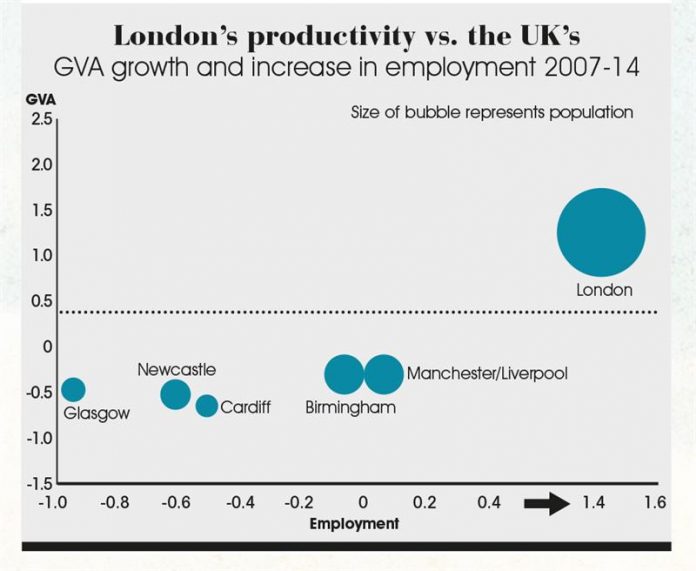With the UK’s low productivity set to be a key concern in the Autumn Budget, new analysis published today reveals the huge disparities in productivity across the country which underpin this problem.
Productivity in cities such as Manchester all fall below the National Average
The new study, published by the think tank Centre for Cities, shows that cities in the Greater South East are by far the most productive places in Britain, and are 44% more productive than cities in other parts of the country.
If all British cities were as productive as those in the Greater South East (GSE), the national economy would be £203bn larger – equivalent to four extra city economies the size of Birmingham.
The strong performance of cities in the Greater South East also makes the region one of the most productive places in Europe.
For example, the new analysis shows that the GSE is considerably more productive than Germany – often held up as an economic model for the UK to follow – with workers in the GSE producing 7% more per hour than their German counterparts in 2015.
The report therefore shows that Britain’s low national productivity is a result of the economic underperformance of cities outside the GSE, most of which fall below that national average for productivity. In 2015, only 12 of Britain’s 62 cities performed above the national average for productivity, eight of which are in the GSE.
In contrast, major cities in the North and Midlands such as Leeds, Manchester and Birmingham all fell below the national average.
Cities outside the Greater South East have weaker productivity because they struggle to attract the higher-skilled components of productive sectors and firms.
Firms choose to locate their high-skilled operations in cities which can offer them access to a high-skilled workforce and other relevant businesses, and will base lower value components in places where land and labour is cheaper. As such, Barclays bases its high-value banking activities in London and its low-skilled call centre in Sunderland. Similarly, clothing company ASOS has a large distribution centre with low-skilled jobs in Barnsley, but its headquarters is located at Kings Cross.
Moreover, highly productive sectors and firms account for larger shares of jobs in cities in the Greater South East than in other cities. On average, cities in the GSE have a larger proportion of workers in sectors and firms which contribute most to national productivity. For example, in 2015 the information and communications sector made up 7% of jobs in cities in the Greater South East, compared to just 3% in other cities. Similarly, the financial industry accounted for 6% of jobs in cities in the GSE, compared to 4% of jobs in cities elsewhere in the country.
As a result, highly productive firms and sectors are more productive in cities in the Greater South East than in other parts of the country. In 2015, the financial sector generated around £155,000 per worker in cities in the Greater South East, compared to £88,000 per worker in cities elsewhere in the country.
In the same year, firms in the information and communications sector generated £102,000 per worker in cities in the Greater South East, but only £76,000 per worker in other cities.
Commenting on the findings of the new briefing, Andrew Carter, Chief Executive of Centre for Cities, said:
“This analysis reveals the stark disparities in productivity across different parts of the country, which should be a central concern for policy-makers tasked with addressing Britain’s sluggish economic output. Productivity is not a problem in the Greater South East, but it is a major issue in cities elsewhere in the country. In particular, Britain’s major cities should be leading the national economy, but instead they are causing it to lag behind that of other countries.
“Unless we get these places to punch at their weight, the national economy will continue to be hamstrung. The Government should therefore focus its efforts to improve national productivity on addressing the issues that hold cities back, such as tackling skills gaps or improving infrastructure. Doing so will have a greater impact than measures aimed at boosting specific sectors, and should be a top priority in both the Budget and upcoming industrial strategy.”







